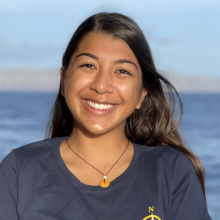
Leilani Sablan
Tell us about your work/research. What kinds of things do you do?
My research as a graduate student at UOGML focuses on Guam's non-commercial fisheries. I work closely with the fishing community in gathering creel and effort data, which helps us in understanding the status of Guam's fisheries and how fishing pressure might be impacting reefs. My study aims at identifying important trends across different fished regions within Guam's non-commercial fisheries, such as catch composition, size structure variation, and biomass differences. In addition, environmental drivers will be identified in this study, which includes season, lunar phase, wind, etc. Together, identifying these trends has the potential to classify fishing pressure indices for the island which may be important in generating management recommendations. Lastly, my study aims to map the post-geographical disposition of reef fishes as driven by social and cultural processes (i.e., fish flow). As non-commercial fisheries are poorly studied in the Pacific, this research hopes to shed light on the importance of such fisheries to the people of Guam.
What sparked your initial interest in your career?
My love for fishing and diving sparked my interest in undertaking fisheries as the next step in my career. Being a fisherwoman myself and fishing Guam's reefs has helped me nurture a special kind of passion that I could not have found anywhere else. Whenever I partake in spearfishing and see how difficult it can be to bring home dinner because of the lack in large fish due to overexploitation, I feel a sense of responsibility as a local CHamoru and fisherwoman to somehow be part of the generation that fixes the problem.
Who influenced you or encouraged you the most?
My mentor and advisor, Dr. Peter Houk, encouraged me to follow my heart and pursue something that my future self would thank me for. He allowed me to really think about the field I wanted to specialize in and how that would benefit me in the long run.
What element of your work/study do you think is the most fascinating?
Throughout my study, I have had the most amazing experience working with and learning from the fishing community in Guam. The fishermen and fisherwomen are the joy of my study, and I am truly thankful that I get to learn something valuable every time I work closely with them.
What other jobs led you to your current career?
My job as a sea turtle biologist at UOG Sea Grant pushed me to pursue my master's degree. Sea turtles used to be an important food source in Guam and therefore part of our fisheries until the ESA protected them. Sea turtles and fish alike have both suffered from overexploitation. After working with nesting sea turtles for almost 3 years now, I felt like I could explore something new and pursue fisheries.
What are your degrees and certifications?
Bachelor of Science in Biology - University of Guam 2019
What are your hobbies?
I love freediving, spearfishing, camping, hiking, playing guitar/ukulele, and taking my dogs to the beach!
What advice would you give someone who wants to have a career like yours?
If you want to pursue fisheries, you have to be a fairly social person. Fisheries work means constantly staying connected with the fishing community, working together with them in collecting data and hearing their concerns. Have respect for every single fisher, even if their thoughts on management do not align with yours. Many fishers are fishing to feed their families, even if it means they do not consider the consequences of overexploitation. Be open minded!
How did you get involved with the Ocean Exploration Trust?
I applied for the Ocean Science Intern position after my boss at UOG Sea Grant sent me a flyer!
Expeditions
Leilani participated in the following Ocean Exploration Trust expeditions:
